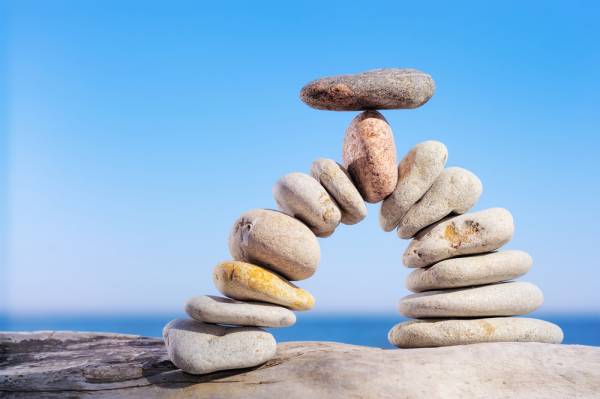A couple people have asked me recently for advice about how they can strike a balance among work, personal obligations, and training. It’s always a useful question to revisit, and I do have some ideas, though the trick is actually implementing them. Here are some thoughts about how to attain that most elusive of goals: life balance.
The first thing to remember is that life balance is not something you fix and forget, especially when you factor Brazilian jiu jitsu, that demanding mistress, into the mix. Life balance is not a destination. Rather, it is a never-ending journey that requires constant adjustment, sometimes major and sometimes barely perceptible. Think about life balance as akin to staying upright on one of those Swiss balls, or keeping your feet while riding the subway without hanging on or leaning on the wall. Sometimes, as when the subway pulls out of the station, we need to make big, sweeping modifications in our positioning to keep from flying into the lap of the person behind us. But then if we turn to the Swiss ball example, even once we have gotten our initial footing, we must constantly make tiny shifts in our weight distribution and proprioception to counteract the effects of the inherent lack of stability the ball provides as a platform. And then, to mix our metaphors yet again, eventually the subway comes to a complete and sometimes sudden stop, necessitating larger adjustments once again.
As on the Swiss ball and in the subway, so in life. How many times this month alone have you planned out your day, complete with appointments and action items, only to have the whole thing shot to hell by some unforeseen event: a sick child, a forgotten deadline, a lunch meeting that goes much longer than anticipated? Speaking for myself, this kind of thing happens to me often enough that I have taken to adding unexpected items to my to-do list after I have completed them just so I can immediately cross them off. That way I can feel I have been productive even once my day has acquired a mind of its own. The point is, if we are going to maintain life balance, we must first acknowledge that doing so requires daily and sometimes hourly or even minute-by-minute care and feeding, to varying degrees. It’s a fact of (a balanced) life. So how do we facilitate that care and feeding?
First, remember that any of your priorities could take up all your time and then some. If you have a family, if you have a demanding career, if you have other interests, or if you have some combination of these, you may have wished now and then for more hours in the day. We would all love to be able to spend enough time on everything that’s important to us and do it all equally well, but there’s really no such thing as “enough” time. A good friend of mine is an expert in conflict resolution, and she is fond of saying that she knows she has been successful in helping the parties in a binding arbitration reach a fair compromise when all of them are equally dissatisfied. In other words, everyone always wants everything they want, but life requires that we make concessions. This is important to remember as we balance the demands on our time as well. We will probably never be completely satisfied with how we allocate our time, and we have to become comfortable with that discomfort.
 This leads to the second thing to remember, which is that there are consequences, both good and bad, for every choice we make. The more we train BJJ, the better we are likely to get at BJJ. But the more we train BJJ, the less time and energy we may have for our non-BJJ-related friends and interests. I know plenty of grapplers who don’t prioritize any other interests or friends outside of grappling, and I used to count myself among this number. This works for them, so mazel tov. In my case, however, more recently my relationship to grappling has transformed, and that has meant making adjustments – some small and some more cataclysmic – in my life to accommodate these changes. But the fact that I understand there are consequences for my actions helps me better own my decisions.
This leads to the second thing to remember, which is that there are consequences, both good and bad, for every choice we make. The more we train BJJ, the better we are likely to get at BJJ. But the more we train BJJ, the less time and energy we may have for our non-BJJ-related friends and interests. I know plenty of grapplers who don’t prioritize any other interests or friends outside of grappling, and I used to count myself among this number. This works for them, so mazel tov. In my case, however, more recently my relationship to grappling has transformed, and that has meant making adjustments – some small and some more cataclysmic – in my life to accommodate these changes. But the fact that I understand there are consequences for my actions helps me better own my decisions.
This leads to the third thing to consider: Given that there are consequences for every action, what are the consequences you can live with? What are the tradeoffs you are willing to make, and in what proportion? In other words, what do you want? You may think that what your coach or your spouse or your boss wants is what you want, because you may think that’s what you should want. But if you can’t establish what your own goals are, then you’ll never be able to strike a balance in your life, even temporarily, that fulfills you. A would-be world champion will prioritize differently in comparison to someone who wants to learn BJJ but is first and foremost committed to a high-powered job, for instance. Where do you fall on this continuum, and what will it take for you to stay there comfortably? Are you willing to do what it takes?
Not entirely sure? Think about it like this: If BJJ is important to you, there are many, including me, who would find that terrific. On the other hand, it is also my fervent belief that being a person of integrity who keeps promises and sees to their responsibilities should also be important to you. BJJ and these personal qualities can complement one another. Indeed, BJJ can be a mechanism for self-actualizing, for enhancing those qualities in ourselves. We owe it to ourselves, to our friends, family, and colleagues, and to BJJ itself to make this happen. To that end, take realistic stock of your goals and your responsibilities, and balance them ethically and with integrity and fairness. Note that this doesn’t always mean doing what you want, if doing what you want is at odds with doing what is right. You might have to skip BJJ to meet a deadline, for instance, because you agreed to the deadline earlier.
 Finally, and this is probably the most important suggestion, be present wherever you are, whether it’s at the academy, with your loved ones, or in the bathroom. Make sure all of you is in the same place, and that your current environment has your undivided attention. To do anything else is a surefire way to feel out of whack. Here’s an example. In 2006, I did a jiu jitsu walkabout: I quit my job, sold my home, traveled North America training BJJ, kept a blog of my adventures, the whole nine yards. During that summer, I stopped in to visit some friends in Portland, Oregon, with the plan to train at several different academies in the area. But these friends, who do not grapple, had a different idea, and they “kidnapped” me for the weekend to join them on their annual rafting trip down the Deschutes River, giving me a hard sell and basically refusing to take no for an answer. (They didn’t understand the allure of spending beautiful summer days inside a sweaty, stinky grappling academy.)
Finally, and this is probably the most important suggestion, be present wherever you are, whether it’s at the academy, with your loved ones, or in the bathroom. Make sure all of you is in the same place, and that your current environment has your undivided attention. To do anything else is a surefire way to feel out of whack. Here’s an example. In 2006, I did a jiu jitsu walkabout: I quit my job, sold my home, traveled North America training BJJ, kept a blog of my adventures, the whole nine yards. During that summer, I stopped in to visit some friends in Portland, Oregon, with the plan to train at several different academies in the area. But these friends, who do not grapple, had a different idea, and they “kidnapped” me for the weekend to join them on their annual rafting trip down the Deschutes River, giving me a hard sell and basically refusing to take no for an answer. (They didn’t understand the allure of spending beautiful summer days inside a sweaty, stinky grappling academy.)
At that time, I hadn’t gone more than two days without training for as long as I could remember, and this trip meant I’d be missing three days in a row. (While this may not seem like a big deal to some of you, I’m willing to bet there are others of you who are feeling anxious on my behalf just from processing the concept of “missing three days of training.” If you are one of those people, obviously I’ve been there, and we should talk.) I vividly remember having a quiet panic attack in the back of the car as we drove farther and farther from Portland and training, precisely because I hadn’t yet figured out how to work on striking a balance between training and the rest of life that was healthy for me. There were two cars in our caravan, and I briefly considered paying somebody to let me take their car and head back to Portland, convinced I had made a terrible, irretrievable mistake. I was that out of my mind. Everyone around me was happy to be there and happy I was with them, and yet I was decidedly not present. As a result, it took me most of that day to let go of needing to train and just allow myself to enjoy the trip, which turned out to be fantastic, of course.
Now, seven years later, I look back on that time and of course have realized many times over that missing three whole days of training turned out not to be fatal. And if I had it to do over again, I would have made a point of being present from the get-go, enjoying what I was doing and giving myself over to it fully. But as I say, striking a balance is never a destination. It’s always a journey.
Each of us has different goals, obligations, and motivations. The clearer we are about these, and the more willing to take responsibility for them, the better able we will be to strike a meaningful balance among all the aspects of our lives – until the next glitch in the system happens.
How do you strike a balance between grappling and the rest of the things in your life that place demands on your time, energy, and attention? Post strategies to comments.
Photos courtesy of Shutterstock.






